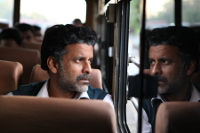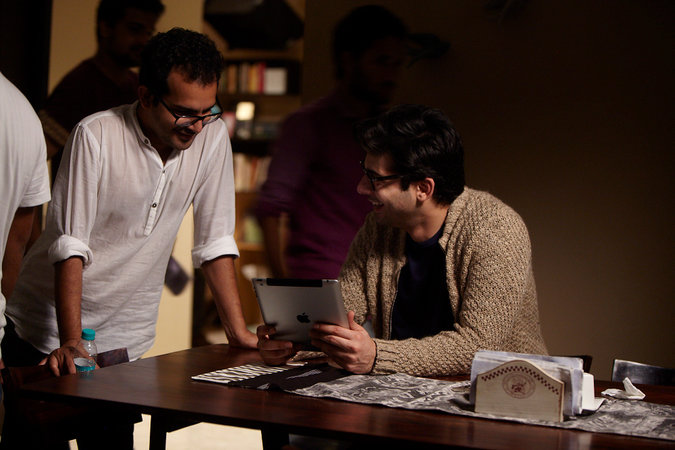16th Annual NEW YORK INDIAN FILM FESTIVAL
May 7 - 14, 2016
REVIEWS
|
Gay-Themed Movies in India Fight Back Against Taboos
APRIL 26, 2016 |
| NYIFF 2016 – A Feast of Cinema |
 |
Manoj Bajpayee in “Aligarh,” a movie about a professor in India who was hounded out of his job,
and eventually found dead, after he was discovered to be gay. Credit via Hansal Mehta |
MUMBAI - Bollywood has a long history of portraying gay characters with clichés or using them as an ostensibly comic sideshow. Often they are sexual predators whom the male leads, epitomes of heterosexual masculinity, must be wary of.
But several recent movies have challenged those stereotypes, suggesting that attitudes in India’s movie industry, or at least within an influential section of it, may be changing.
“Aligarh,” based on the true story of a gay professor who was hounded, possibly to death, opened nationwide in India in February to critical acclaim. (On May 14 the movie will be the closing offering at the New York Indian Film Festival.) It features mainstream actors - with the lead role Manoj Bajpayee in the lead role - a casting approach without precedent in Bollywood and unthinkable just a few years ago.
“Aligarh” was followed in March by “Kapoor & Sons,” a multistar big-budget Bollywood movie in which one of the two male leads is revealed to be gay. A tale of messy family relationships inspired by Woody Allen’s “Hannah and Her Sisters,” the film surpassed roughly $16 million in revenues, the Bollywood gold standard for commercial success.
This progressive turn is simultaneously a product of and a response to the changing mores of the urban middle class, which has developed a more tolerant view than other segments of society. This contingent is numerically a minority but it is Bollywood’s most significant source of revenue. Hansal Mehta, the director of “Aligarh,” acknowledged that he would not have found a backer for his movie a decade ago.
“The audience is more evolved than we think,” Shakun Batra, director of “Kapoor & Sons,” said.
The success of “Aligarh” and “Kapoor & Sons” is likely to lead to more movies on this theme. One of them, “Dear Dad,” woven around a road trip involving a father and son, opens nationwide in India on May 6.
“The Threshold,” a short feature about an adolescent boy struggling with his sexual identity, had its premiere on April 8 in Los Angeles, although it belongs to the world of alternative filmmaking that is largely confined to university campuses and the urban elite in India.
“Timeout,” a high school drama about a relationship between brothers that grows strained when one comes out, was released in September, although it did not have much critical or commercial impact. So far the films have been confined to the subject of male same-sex relationships.
This efflorescence of movies on the subject has not come about easily. In a country where the struggle continues to legalize gay sex, the movies have faced hurdles almost from their inception. |
 |
| The director Shakun Batra, left, with Fawad Khan, the Pakistani actor who plays a gay character in “Kapoor & Sons,” a big-budget film inspired by Woody Allen’s “Hannah and Her Sisters.” Credit Shakun Batra |
“Aligarh” was based on a 2010 case involving S. R. Siras that made headlines in India. Mr. Siras, a professor at Aligarh Muslim University in India, was surreptitiously filmed while having sex with a male companion in his apartment and later suspended by the university on charges of sexual misconduct.
The movie narrates his troubled last days, an invasion of his privacy followed by public humiliation and a professional witch hunt that ends in his mysterious death, considered by many to have been a suicide. Through the movie, Mr. Siras, in a widely lauded performance by Mr. Bajpayee, is a socially troubled man under siege in a homophobic society.
The movie narrates his troubled last days, an invasion of his privacy followed by public humiliation and a professional witch hunt that ends in his mysterious death, considered by many to have been a suicide. Through the movie, Mr. Siras, in a widely lauded performance by Mr. Bajpayee, is a socially troubled man under siege in a homophobic society.
“Aligarh” faced controversy even before filming began. Opposition arose within Aligarh Muslim University as news of the project spread: Mr. Mehta, the director, was preparing to travel to Aligarh, roughly two hours from New Delhi, for research when a call from the vice chancellor’s office warned him of trouble and told him not to come. The hostility led Mr. Mehta to move the filming to Bareilly, a town of similar size about 100 miles east of Aligarh. Mr. Mehta and Mr. Bajpayee never got to Aligarh.
India’s censorship board gave the movie’s trailer an A rating, equivalent to R in the United States, even though it had no graphic or sexual content.
The mayor of Aligarh pressured local theaters to take it off the screens, leading to an effective ban.
Mr. Mehta, who was unaware of Mr. Siras until a fan emailed him suggesting that his story had the makings of a movie, said he was not surprised by the backlash. “A university that treats its faculty member in this manner is bound to be resistant,” he said. “A town that renders him homeless is bound to be resistant.”
“Kapoor & Sons,” a film even more firmly in the universe of mainstream Bollywood, did not find itself the subject of a public storm. Instead, it was confronted by a movie industry often fearful of change. Five actors turned down the part of the gay lead, Mr. Batra said, and his search went on for a year until Fawad Khan, a Pakistani actor popular in India, took on the role.
Mr. Batra and the movie’s producers, aware that the film’s plotline could be commercially risky, decided to avoid any mention of same-sex relationships in the movie’s promotions. “A big part of our society is homophobic,” Mr. Batra said, and he did not want to alienate audiences “by telling them straightaway that this is a coming-out-of-the-closet story, and half of them don’t even show up.”
Mr. Batra said that it was “high time” mainstream Bollywood portrayed gay lives in a dignified way. “The impulse came from watching so many bad Bollywood movies that use homosexual characters as caricatures,” he said. “I was thinking: Why are we making these characters comical? Why are they only there for promiscuous jokes?”
The movies arrive at a delicate moment in the long battle for lesbian, gay, bisexual and transgender rights in India. In February, the Supreme Court of India agreed to review its widely condemned 2013 judgment that reinstated a ban on gay sex, a law known as Section 377. The decision once again raised the temperature of the long-running battle between liberals and conservatives on the issue, a conflict within Indian society reflected by the reaction to “Aligarh” and “Kapoor & Sons.”
The embrace of these new movies may also make them something of a bellwether of the direction in which the discourse on L.G.B.T. rights in India is moving.
“Section 377 will eventually be thrown out,” Mr. Mehta said. “‘Aligarh’ is part of that larger history that this country is going to experience.” |
| |
| URL:- http://www.nytimes.com/2016/04/27/movies/gay-themed-movies-in-india-fight-back-against-taboos.html?smid=fb-share |
| |
|
|
|

